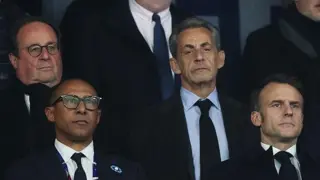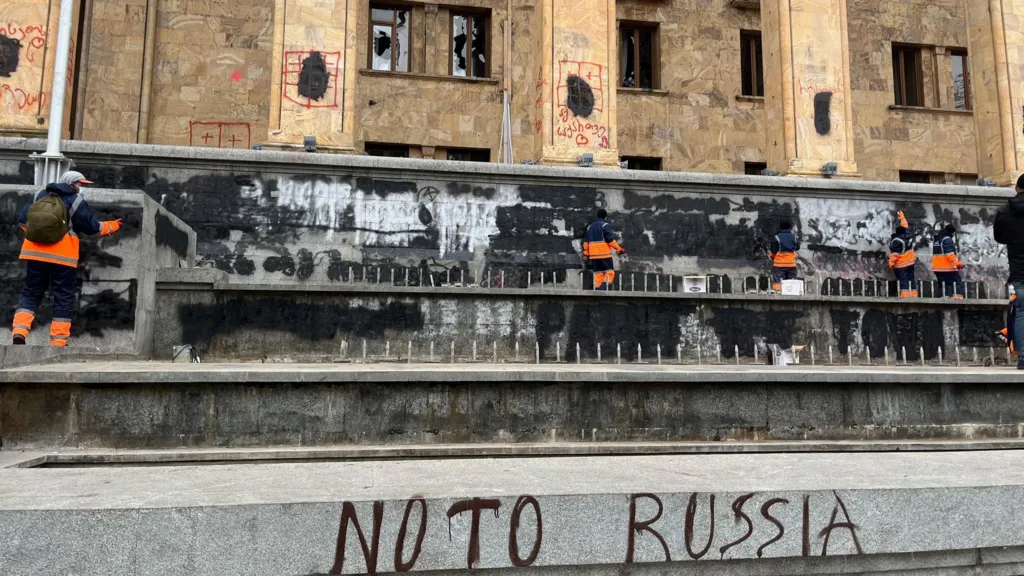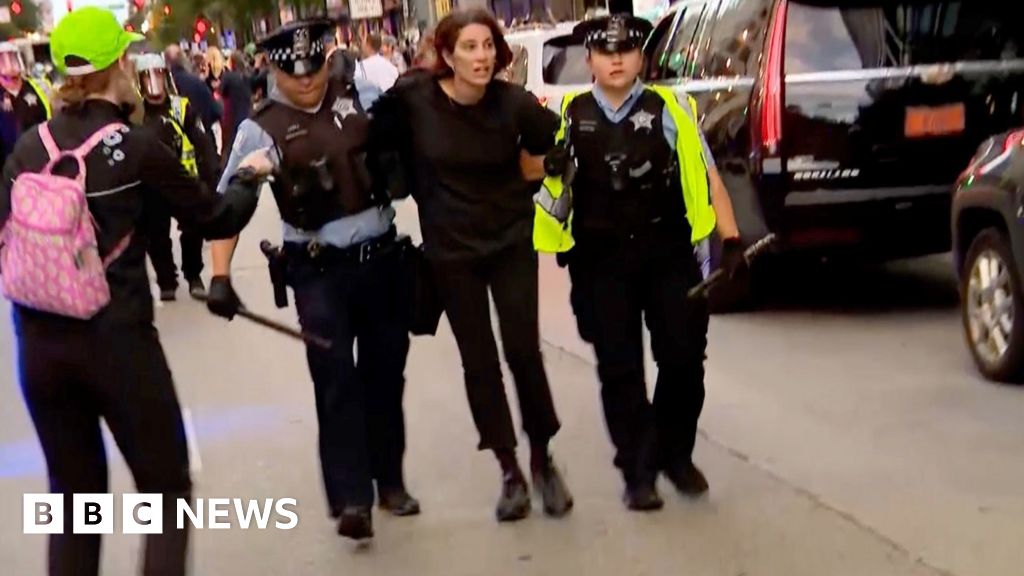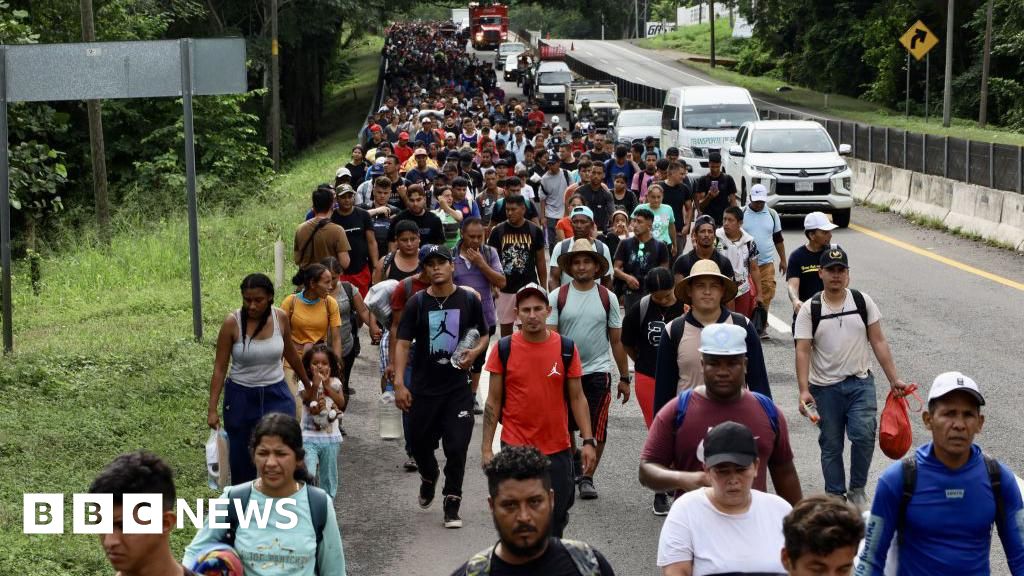Some football fans attending the European Nations League match in Paris between France and Israel whistled and booed as the Israeli anthem played at the start of the game.
Thursday’s match was played in front of scant crowds and heavy security a week after violence in Amsterdam between pro-Palestinian demonstrators and visiting Israeli fans.
Despite fears of a repeat of the Amsterdam violence, there were just a few brief scuffles in the stands during the first half of the game, which ended in a 0-0 draw.
President Emmanuel Macron – who attended the match with Prime Minister Michel Barnier – said beforehand that France would not give in to antisemitism.
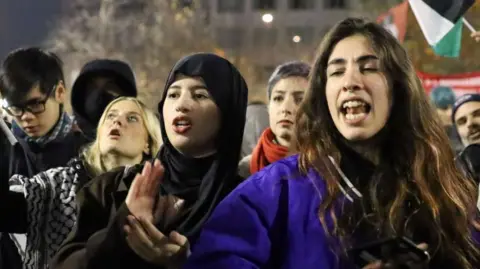 Getty Images
Getty ImagesThousands of police were deployed to ensure security at the Stade de France in the northern Paris suburbs and on public transport, while an elite anti-terrorist police unit protected the visiting Israeli squad.
A reporter for France’s AFP news agency witnessed stewards intervening to stop clashes in the stands between rival fans.
According to Reuters news agency, some 100 Israel fans defied travel warnings from their government and sat in a corner of the 80,000-capacity stadium, which was barely a fifth full.
Waving yellow balloons, they chanted “Free the Hostages” in reference to Israelis held in Gaza by Hamas militants, the agency reports.
Before the match, several hundred demonstrators gathered in a square near the stadium to wave Palestinian, Lebanese and Algerian flags in protest at the war in Gaza.
“We don’t play with genocide,” one banner read.
Israel has denied allegations of genocide as baseless and grossly distorted.
It launched a campaign to destroy Hamas in response to the group’s unprecedented attack on southern Israel on 7 October last year when about 1,200 people were killed and 251 others were taken hostage.
More than 43,700 people have been killed in Gaza since then, according to the territory’s Hamas-run health ministry.
Politicians across Europe decried a “return of antisemitism” after Israeli fans were chased through the streets of Amsterdam.
Maccabi fans were themselves involved in vandalism, tearing down a Palestinian flag, attacking a taxi and chanting anti-Arab slogans, according to city authorities. They were then targeted by “small groups of rioters… on foot, by scooter or car”, the city said in a 12-page report.
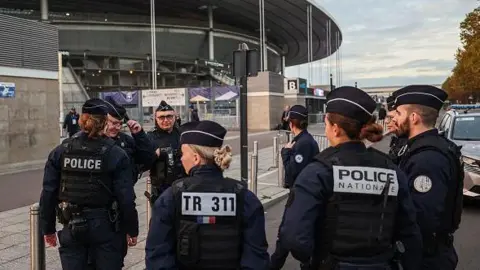 AFP
AFPViolence between Israel and its neighbours in the Middle East has the potential to spread to Europe.
France, Belgium and the Netherlands all have large Muslim populations of North African origin and they live beside far smaller Jewish populations, who in the main identify strongly with Israel.
To express solidarity with European Jews after Amsterdam, President Emmanuel Macron attended Thursday’s match along with Prime Minister Michel Barnier and former presidents François Hollande and Nicolas Sarkozy.
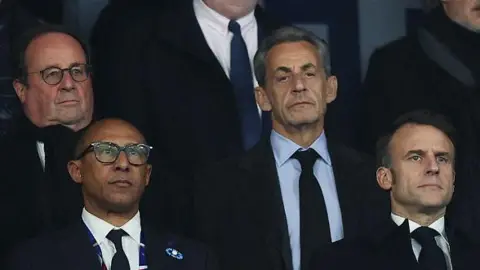 AFP
AFPSupporters were told to expect identity checks ahead of the game while bars and restaurants in the area were told to close from the afternoon.
The Stade de France was the scene of a dangerous breakdown in law and order at a Uefa Champions League final between Liverpool and Real Madrid in 2022. However since then the Rugby World Cup and Paris Olympics have both been peacefully staged there.
France’s far-left France Unbowed (LFI) party – which sides with Palestinians and Lebanese in the conflicts with Israel – called for Thursday’s match to be cancelled, or at least for Macron to refuse to attend.
“We do not want our head of state honouring a country that commits genocide,” said LFI deputy David Guiraud.
But Interior Minister Bruno Retailleau said it was out of the question to cancel or relocate the match. “France does not give way to those who sow hatred,” he said.
France and Israel are in the same group in the Uefa competition, alongside Italy and Belgium. In their first leg – played in Budapest – France beat Israel 4-1.
Pre-match tensions were already in evidence on the eve of the match after a pro-Israeli “gala” event was given the go-ahead in Paris, which the far-right Israeli minister Bezalel Smotrich was at one point expected to attend – although it was later thought his “presence” would be by video-link.
Several thousand pro-Palestinian and anti-racist organisations also staged protests in the capital to coincide with the event. Clashes broke out and police used tear gas as protesters targeted a McDonald’s on the Boulevard Montmartre.
Relations between Macron and Benyamin Netanyahu have come under severe strain in recent weeks, after Macron accused the Israeli prime minister of “spreading barbarism” in Gaza and Lebanon.
French Jews were also upset when Macron was quoted as saying that Netanyahu should accept United Nations calls for a ceasefire because “his country was itself created by a decision of the UN”. This was interpreted in Israel as an insult to Jews who had lost their lives in their country’s war of independence.
France in turn was angered when two French officials were briefly detained by Israeli authorities at a holy site in East Jerusalem that is under French administration.
Macron has been described as pursuing a zigzag in his approach to the Middle East, as in many other domains, flipflopping inconsistently between outspoken statements of support for Israel and then its Arab neighbours.
